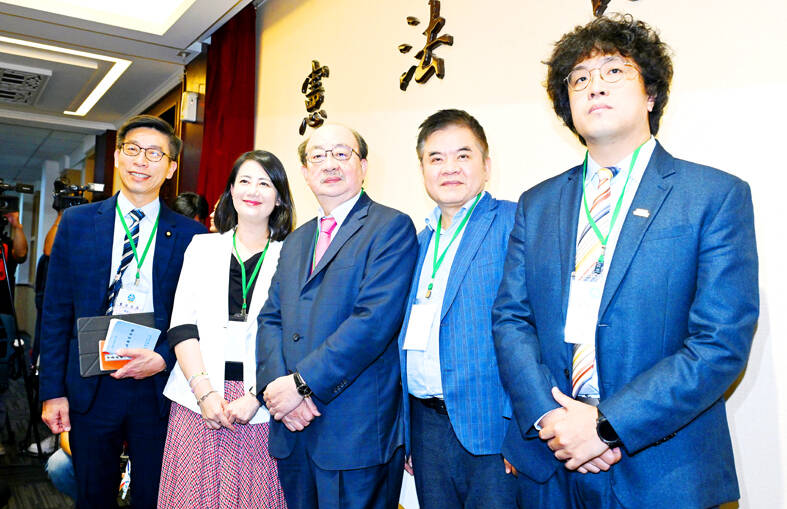Lawyers representing four parties that filed for an injunction and a constitutional interpretation of the amendments expanding the legislature’s powers yesterday urged the Constitutional Court to approve the injunction, saying the changes would damage the constitutional order.
The court began preliminary hearings on the injunction.
The Legislative Yuan passed the amendments on May 28 and promulgated them on June 26. It was followed by a historic first in which the Democratic Progressive Party’s (DPP) legislative caucus, the Executive Yuan, President William Lai (賴清德) and the Control Yuan all filed for a ruling on their constitutionality.

Photo: Liao Chen-huei, Taipei Times
Constitutional Court Chief Justice Hsu Tzong-li (許宗力) said that all applications have been uploaded onto the Internet as per regulations, and the court is starting the preliminary processes on hearing the case.
The Presidential Office’s legal representative, Hong Wei-sheng (洪偉勝), expressed his approval of the Constitutional Court’s transparency and said accusations over its procedures are baseless.
Hung’s remarks referred to Taiwan People’s Party (TPP) Legislator Huang Kuo-chang’s (黃國昌) comments asking for Hsu to clarify the regulations as stipulated under the Constitutional Court Procedure Act (憲法訴訟法) and why the Legislative Yuan had not received any notifications.
Huang also asked whether the preliminary hearings were based on Article 43 the act or were they preliminary hearings for the oral defense.
The amendments to are flawed, contravening the Constitution, disrupting the separation of powers, undermining responsible politics and throwing government bodies into disarray, Hong said.
The amendments would irreparably damage the basic tenets of the Constitution, and there was an urgent need for an injunction, he said.
Lee Chuan-he (李荃和), the Executive Yuan’s legal representative, said the amendments placed additional restrictions on candidates for a government office and that the legislature could stall appointments made it urgent to impose an injunction against them.
Chen Peng-kuang (陳鵬光), the DPP’s legal representative, said the amendments would hinder the independent operation of the Judicial Yuan, the Control Yuan and the Executive Yuan.
The Control Yuan’s legal representative, Lee Yuan-te (李元德), said the Control Yuan had no other recourse other than the Constitutional Court, as the president’s powers to mediate between government branches were limited to “political disputes.”

Taiwanese can file complaints with the Tourism Administration to report travel agencies if their activities caused termination of a person’s citizenship, Mainland Affairs Council Minister Chiu Chui-cheng (邱垂正) said yesterday, after a podcaster highlighted a case in which a person’s citizenship was canceled for receiving a single-use Chinese passport to enter Russia. The council is aware of incidents in which people who signed up through Chinese travel agencies for tours of Russia were told they could obtain Russian visas and fast-track border clearance, Chiu told reporters on the sidelines of an event in Taipei. However, the travel agencies actually applied

New measures aimed at making Taiwan more attractive to foreign professionals came into effect this month, the National Development Council said yesterday. Among the changes, international students at Taiwanese universities would be able to work in Taiwan without a work permit in the two years after they graduate, explainer materials provided by the council said. In addition, foreign nationals who graduated from one of the world’s top 200 universities within the past five years can also apply for a two-year open work permit. Previously, those graduates would have needed to apply for a work permit using point-based criteria or have a Taiwanese company

The Shilin District Prosecutors’ Office yesterday indicted two Taiwanese and issued a wanted notice for Pete Liu (劉作虎), founder of Shenzhen-based smartphone manufacturer OnePlus Technology Co (萬普拉斯科技), for allegedly contravening the Act Governing Relations Between the People of the Taiwan Area and the Mainland Area (臺灣地區與大陸地區人民關係條例) by poaching 70 engineers in Taiwan. Liu allegedly traveled to Taiwan at the end of 2014 and met with a Taiwanese man surnamed Lin (林) to discuss establishing a mobile software research and development (R&D) team in Taiwan, prosecutors said. Without approval from the government, Lin, following Liu’s instructions, recruited more than 70 software

Chinese spouse and influencer Guan Guan’s (關關) residency permit has been revoked for repeatedly posting pro-China videos that threaten national security, the National Immigration Agency confirmed today. Guan Guan has said many controversial statements in her videos posted to Douyin (抖音), including “the red flag will soon be painted all over Taiwan” and “Taiwan is an inseparable part of China,” and expressing hope for expedited reunification. The agency last year received multiple reports alleging that Guan Guan had advocated for armed reunification. After verifying the reports, the agency last month issued a notice requiring her to appear and explain her actions. Guan